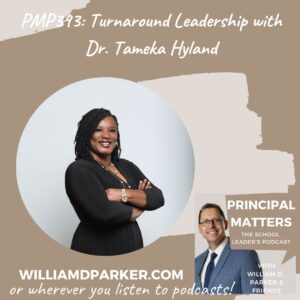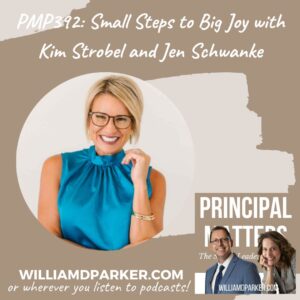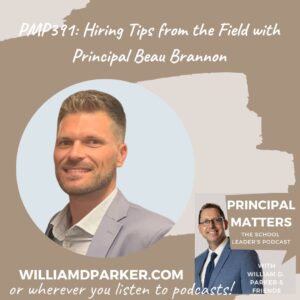Podcast: Play in new window | Download
When Jen Schwanke and I sat down to talk about my new book this week, Jen turned the microphone to ask me some questions.

Jen Schwanke is the principal of Indian Run Elementary and author of two books, You’re The Principal, Now What? and The Principal Re-Boot: 8 Ways to Revitalize Your School Leadership.
Here are some takeaways from our conversation:
Questions from Jen
Jen: Your new book Pause. Breathe. Flourish. Living Your Best Life as an Educator came out just two months ago. Congratulations! Let’s talk about it. I know you’ve done some reviews of your recent book on your podcast, but I want to ask you some questions about why you thought this book was an important one to share with the universe. What was your drive to write it?
WDP: This book was a response to the consistent question education leaders ask: How do I take care of myself in this very difficult work? Pause. Breathe. Flourish.: Living Your Best Life as an Educator explores the habits, practices, and mindset necessary for growth as both an educator and a person. Research shows that teachers and principals are leaving the profession of education at alarming rates.
Some of the causes stem from the rising expectations and demands that educators find difficult to manage. Unfortunately, for many educators, taking care of others often means neglecting their own health and well-being. How can educators continue doing work they love while also making sure they are protecting themselves in the process? Pause. Breathe. Flourish. provides practical strategies and common-sense approaches for taking better care of yourself so that you can better serve and lead others.
Jen: I feel like a lot of damage is done when we tell others to just “chill” out. But asking them to breathe seems more appropriate. Even when we cannot relax, we can at least breathe. You take it another step by sharing lessons from your own life and from others on how to flourish. What is it you are sharing about living your best life?
WDP: In the book, I unpack categories on health, mindset, resources, relationships, and legacy among others. This is really a book that applies to all people, not just educators. In it, educators will discover how your thoughts, relationships, commitments, values, and habits play an essential role in who you are as a person. Understanding ‘who you are’ plays heavily in your ability to weather storms, maintain perspective, work with purpose and effect meaningful change in the lives of others. Applying those insights can be challenging. This book will help you reconsider your mindset, reading habits, personal health, financial commitments, relationship priorities, and legacy building.
Jen: For those who haven’t yet had the chance to read your book, will you tell the story about writing your resignation letter and how that helped you keep your sanity and soul?
WDP: My moment of reckoning came my second year as an administrator when I was spending so much time focused on school at the expense of my own health and family life. One night my wife told me, “Will, the kids and I have accepted that you are a dad and husband on the weekends only. In fact, you’ve become a shell of the man you used to be.” She said this with no bitterness or resentment, just simple resignation. That night I wrote a letter of resignation. I took it to work and placed it in a folder that set on the corner of my desk. Each day I began telling myself: I’m either going to find a way to reconnect with those areas of my life outside of work or I will find another occupation. That was a turning point for me that helped shape the message of this book.
Jen: Your book is a very personal one. You tell a lot of stories, share memories, and make connections to your work. Why do you feel this personal approach is so helpful to administrators?
WDP: Vulnerability is an important part of building trust. Just like good classroom teachers connect with students through trusting relationships, the same principle applies in all relationships, including sharing lessons with educators. It’s not easy being transparent about my own challenges and struggles, but those personal stories are hopefully building trust so those lessons really connect.
Jen: Your book is meant to be a source for self-reflection. What role has self-reflection had on your role as a school and state educational leader?
WDP: Self-reflection is a mindset. It’s important in the classroom and in school leadership. As a creative writing teacher, I would teach my students to really “see” and observe their environments. Closely examining your surroundings is a helpful practice for really being in the moment. When we apply this to teaching, it means we reflect on what we are teaching, what students are learning, and how we must change instruction to take them to their next level. That cycle of self-reflection applies to school leadership and life as well.
Jen: One of the things I feel is important for administrators is to stay connected to the teacher experience. How do you do that?
WDP: There is a tension for every leader to be student centered while also supporting teachers. It’s important we put ourselves back into the shoes of those whom we are leading. Resistance is not always personal. As you say Jen, ‘Just because I disagree with you doesn’t mean you’re wrong.’ Hearing and accepting are essential for staying connected to teachers. We also have to ask ourselves how are we modeling acceptance and resistance. Teachers mirror the behavior of their leaders. So reflect on how you are modeling what you want to see in them.
Jen: Next week, we’ll unpack even more. Thanks for the opportunity to learn more about the new book!
Now It’s Your Turn
As you reflect on your own practice in education, how has self-reflection become a part of your own learning cycle? How are you able to integrate your own personal experience to build trusting relationships? What ways are staying connected with the work of teachers so you keep perspective on what it is like to walk in their shoes?


